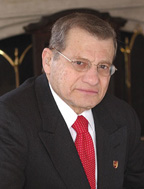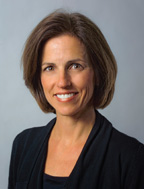
Barnett Helzberg Jr., Helzberg Entrepreneurial Mentoring Program
With a hat tip to the late management guru Peter Drucker, Barnett Helzberg Jr. boils this whole capitalism thing down to its essence: “The purpose of business is to create customers. If you create customers, you create jobs.” That’s really all you need to know about wealth creation and the concept of prosperity. Focus on the wealth instead of on the customers, you’ll likely have neither.
Prosperity is in the Helzberg family’s DNA. His grandfather founded the family’s jewelry business with a single store in Kansas City in 1915. After taking the reins in 1962, Barnett built it into a chain of 134 stores in 23 states before selling to Warren Buffett’s Berkshire Hathaway in 1995. His experience with the Oracle of Omaha prompted Helzberg to pen a book, “What I Learned Before I Sold to Warren Buffett,” a series of business management lessons that, taken together, constitute a roadmap to success.
Among them were the Three Magic Questions he’d formulated to grow his own customer base: “What are we doing that you like? What are we doing that you don’t like? What are we not doing that you’d like us to do?”
Helzberg has been able to use the proceeds of the sale to engage in various philanthropic causes in the region, including creation of the Helzberg Entrepreneurial Mentoring Program and funding for the University Academy.
As with business, he said, he’s learned to focus less on mission statements, high-profile names on boards or administrative costs than on what really matters—“outcomes,” he declares. “What’s relevant is, did they cure cancer? Diabetes? Do good research? Those are outcomes. Same with business: Does it create jobs?” In that sense, he’s a bit disconcerted over the early back-and-forth of the looming presidential debate, especially with criticisms of Mitt Romney’s role with the private equity firm Bain Capital. “You know, Bain pumped $100 million into Armco Steel to keep it going; it’s not just like they threw the company away,” Helzberg said of the Kansas City venture being cited by Romney’s critics as an example of a capitalism that has lost its bearings. Successful organizations, he says, must operate “in an ever-increasingly competitive environment. That’s what’s great about the whole system: I always figured you owe it to your associates to be profitable, to pay well and to keep up the quality.” Otherwise, he said, you end up with tombstones etched for companies once considered invincible. “Everybody knows that great companies have been really profitable, but when they stop, they’re gone,” he said. “Some people say profits are a bad thing, but look at the graveyard of business.
“I don’t understand the vilification.”

Debbie Wilkerson, president & CEO
Greater Kansas City Community Foundation
In a town with a well-deserved reputation for punching far above its philanthropic weight, and in a community culture that values entrepreneurship, one man above all others set a new standard for passing along some of his accumulated wealth: Ewing Kauffman. Let Debbie Wilkerson explain. She’s president and CEO of the Greater Kansas City Community Foundation, which lends an organizational structure to donors by assisting with more than 3,000 individual charitable funds. Some are but a few thousand dollars in size; others reach tens of millions. That accumulated wealth has allowed the foundation to issue $1.7 billion in grants in its 33-year history.
Among those, she says, one gift stands out—when Kauffman gave the Royals to the foundation to ensure the team would remain in Kansas City. “It marked the first time in history that the Internal Revenue Service had approved a charitable deduction for the gift of a major league sports team,” she said. “That was a wonderful gift to the community.”
Wilkerson rose to the leadership position at the foundation earlier this year, after nearly 14 years in various roles there. Her work in the field of giving, she says, has produced equally inspiring examples of philanthropy that fall well short of the zeroes that Ewing Kauffman could put on a check, but matched him in depth of feeling. When it comes to giving, she said, “equally wonderful is the grandfather who uses his fund to give his grandkids giving cards. He wants them to learn to be philanthropists, too.”
That’s key for Wilkerson, who sees prosperity from a vantage point most of us never will. “Most people assume that to be a philanthropist, you must be wealthy and willing to give away thousands or millions of dollars,” she said. “In reality, anyone can be a philanthropist by giving what they can in an organized and thoughtful manner. Every day we help people at all income levels make the most of their giving. Even a person with a small charitable fund is a philanthropist.”
The foundation’s creators hoped to leverage that very act of individual giving, she said, when the organization was formed 30 years ago, out of a belief that “philanthropy should be the responsibility of many, not just a few.”
“They recognized the extremely generous nature of our community and knew that donors at every level would participate in philanthropy if given the encouragement and tools to make giving easy and effective,” Wilkerson said. But her view of giving goes beyond a checkbook: “We know that every gift makes a difference—no matter how big or small—and we encourage everyone to support the causes they care about. We believe that all giving is good, whether it’s financial, volunteering, or in-kind donations. We celebrate the good work our donors do not only through their funds, but with their personal time and resources.”